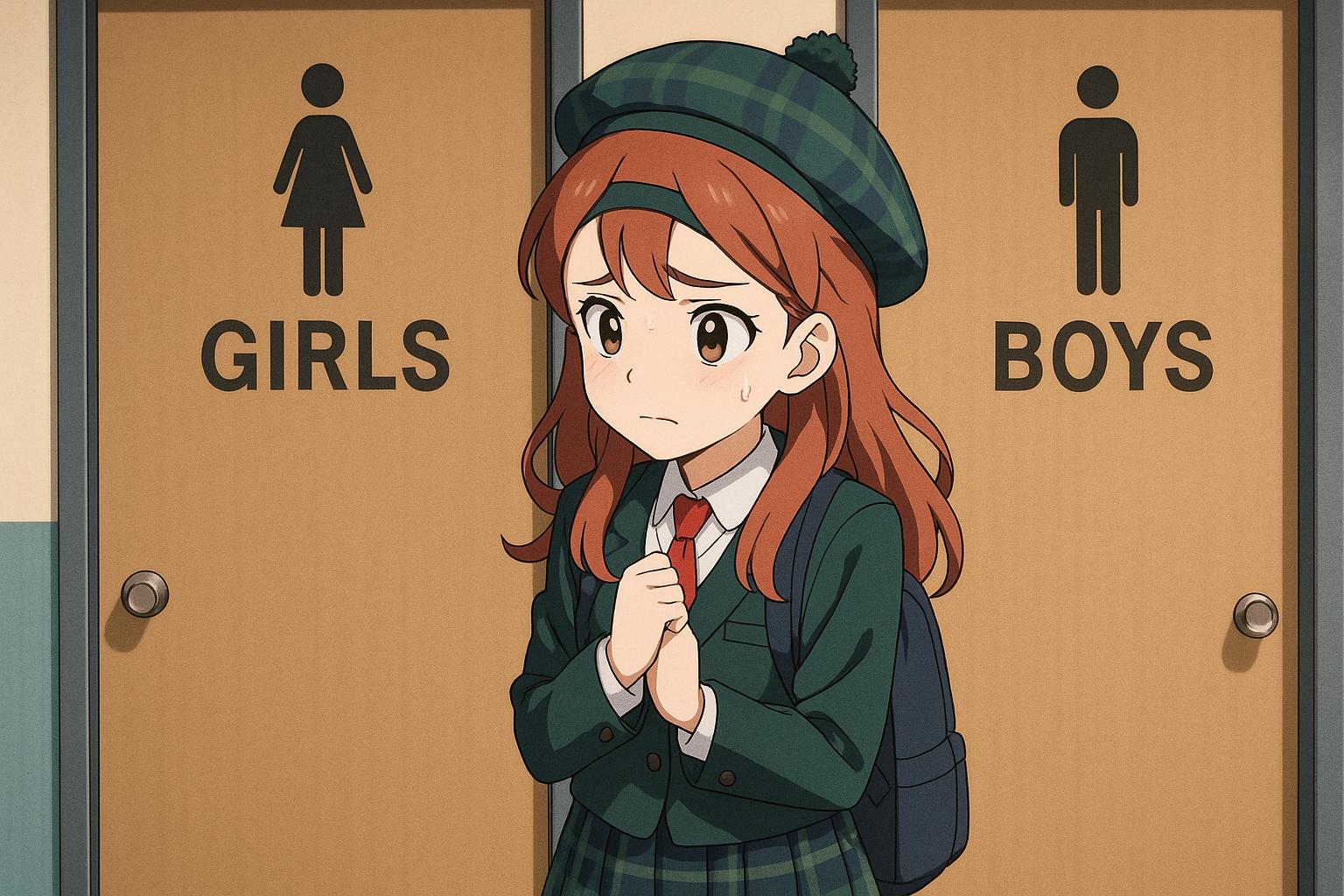Despite a Court of Session ruling mandating single-sex school toilets, nearly 100 complaints have been lodged over gender-neutral facilities, as councils and the Scottish Government navigate complex legal and social challenges.
Young girls in Scotland are still facing the prospect of sharing school toilets with boys, despite a recent court ruling mandating the provision of single-sex facilities. This decision, delivered by the Court of Session in Edinburgh, has prompted significant public concern, as evidenced by almost 100 complaints made to local councils regarding gender-neutral toilets since 2021.
The controversy is particularly pronounced in East Dunbartonshire, where the council has reported the highest number of grievances, with 51 complaints logged regarding its inclusive toilet facilities. A spokesperson for the council noted, however, that only two of these were officially submitted. Scottish Conservative MSP Pam Gosal condemned the situation, describing it as “totally unacceptable” for young girls to be compelled to share toilet and changing facilities with boys.
Rising scrutiny around this issue follows a string of significant legal rulings. In addition to the Court of Session’s decision, a case concerning Scottish Borders Council has further highlighted the legal complexities around the provision of single-sex spaces. This followed a successful challenge by parents against the installation of unisex toilets at a local primary school, a decision now seen as setting a precedent that could reshape school policies across Scotland.
The implications of the UK Supreme Court’s recent definition of ‘woman’ and ‘sex’ under the Equality Act 2010—which underscores biological sex—have reverberated through various public sectors in Scotland, including schools and health services. Following the ruling, the Scottish Government has expressed the need for urgent discussions with the UK Government to clarify the ramifications of this judgment on gender rights and policies.
In parallel, local councils are grappling with the enforcement of these new guidelines. The Midlothian Council, for example, is currently reviewing its facilities, awaiting further national guidance on how to comply with the legal mandate for single-sex toilets. Councils such as East Lothian have taken proactive steps, recently updating signage in some schools to distinctly label facilities for boys and girls, along with maintaining accessible disabled toilets.
Public sentiment regarding gender-neutral policies reveals a divide, with supporters advocating for inclusivity, while many parents and political representatives express growing unease over implications for safety and privacy among schoolchildren. Advocates for single-sex provisions argue that the safety of all students must be prioritised—an assertion echoed by those who believe that inclusive policies can lead to uncomfortable situations for vulnerable groups.
As discussions continue among local authorities and the Scottish Government, it is clear that the need for clarity and robust policies surrounding gender in educational settings is critical. The outcome of these conversations will likely dictate the future landscape of toilet facilities in schools across Scotland, ensuring that the rights and comfort of all students are considered. The road ahead is fraught with complexities, as legislative interpretations continue to shift amid evolving societal norms.
Amidst these changes, the push for action and clear guidelines remains urgent—both to address the existing complaints and to pave the way for a solution that respects the needs of all students within Scotland’s educational framework.
Reference Map
- Lead article detailing the situation in Scottish schools regarding toilet facilities.
- Overview of Midlothian schools responding to recent court rulings.
- Information on Scottish ministers seeking dialogue with the UK Government on the rulings.
- Statement from the Scottish Government regarding alignment with the Equalities and Human Rights Commission.
- Former First Minister Sturgeon’s comments on the broader implications for transgender individuals.
- Parents’ reaction to the ruling about unisex toilets at Earlston Primary School.
- NHS health boards preparing for new guidance following the Supreme Court ruling.
Source: Noah Wire Services
- https://www.dailymail.co.uk/news/article-14722787/Girls-forced-share-loos-boys-despite-schools-facing-94-complaints.html?ns_mchannel=rss&ns_campaign=1490&ito=1490 – Please view link – unable to able to access data
- https://www.midlothianview.com/news/eight-schools-face-review-after-gender-court-rulings – Eight schools in Midlothian, Scotland, are reviewing their toilet facilities following recent court rulings on gender rights. The Midlothian Council is awaiting national guidance after a Court of Session ruling mandated single-sex toilets in schools. Additionally, the UK Supreme Court’s definition of ‘woman’ as biological sex has led to the European Court of Human Rights issuing interim guidance that trans women should not be permitted to use women’s facilities. East Lothian Council has already updated signage in two primary schools to designate boy and girl facilities, with disabled toilets also available. ([midlothianview.com](https://www.midlothianview.com/news/eight-schools-face-review-after-gender-court-rulings?utm_source=openai))
- https://www.ross-shirejournal.co.uk/news/national/scottish-ministers-want-urgent-meeting-with-uk-government-on-gender-ruling-131733/ – Scottish ministers have called for an urgent meeting with the UK Government to discuss the implications of the UK Supreme Court ruling that defines ‘woman’ and ‘sex’ under the Equality Act 2010 as referring to biological sex. The ruling means transgender women with a gender recognition certificate can be excluded from single-sex spaces if ‘proportionate’. A Scottish Government spokesperson stated they have written to the UK Government seeking an urgent meeting to discuss the judgment’s implications. ([ross-shirejournal.co.uk](https://www.ross-shirejournal.co.uk/news/national/scottish-ministers-want-urgent-meeting-with-uk-government-on-gender-ruling-131733/?utm_source=openai))
- https://www.strathspey-herald.co.uk/news/national/scottish-government-keen-to-work-with-equalities-watchdog-after-gender-ruling-132248/ – The Scottish Government has expressed a desire to collaborate with the UK Equalities and Human Rights Commission (EHRC) to ensure consistent and comprehensive guidance following the UK Supreme Court ruling that defines ‘woman’ and ‘sex’ under the Equality Act 2010 as referring to biological sex. The EHRC has published interim guidance stating that trans women should not be permitted to use women’s facilities in workplaces and public-facing services. The Scottish Government is keen to meet with the EHRC to discuss the guidance. ([strathspey-herald.co.uk](https://www.strathspey-herald.co.uk/news/national/scottish-government-keen-to-work-with-equalities-watchdog-after-gender-ruling-132248/?utm_source=openai))
- https://care.org.uk/news/2025/05/sturgeon-criticises-supreme-court-ruling-on-single-sex-spaces – Former First Minister Nicola Sturgeon has criticized the UK Supreme Court ruling that defines ‘woman’ and ‘sex’ under the Equality Act 2010 as referring to biological sex. She expressed concern that the ruling could make life ‘almost unliveable’ for transgender individuals. Sturgeon accepted the Supreme Court’s authority but warned that the practical implications could lead to ‘impossibly difficult’ situations for transgender people. She emphasized that safety for women should not come from barring trans individuals but from addressing predatory male behavior. ([care.org.uk](https://care.org.uk/news/2025/05/sturgeon-criticises-supreme-court-ruling-on-single-sex-spaces?utm_source=openai))
- https://www.itv.com/news/border/2025-04-24/parents-welcome-court-ruling-that-use-of-unisex-toilets-at-school-was-unlawful – Parents in Scotland have welcomed a court ruling that the use of unisex toilets at Earlston Primary School was unlawful. The ruling followed a legal challenge brought by parents against Scottish Borders Council, which had installed gender-neutral toilets at the school. The court’s decision is expected to have far-reaching implications, with all schools in Scotland now required to review whether their toilets comply with regulations requiring single-sex facilities. ([itv.com](https://www.itv.com/news/border/2025-04-24/parents-welcome-court-ruling-that-use-of-unisex-toilets-at-school-was-unlawful?utm_source=openai))
- https://www.scotsman.com/news/politics/nhs-health-boards-issue-update-on-single-sex-spaces-following-supreme-court-ruling-5089829 – NHS health boards in Scotland are awaiting new national guidance on single-sex spaces following a landmark UK Supreme Court ruling that defines ‘woman’ and ‘sex’ under the Equality Act 2010 as referring to biological sex. The ruling is expected to have significant implications across Scotland, including in the health service, where previous guidance has allowed trans women to use female-only spaces such as changing facilities. NHS boards are anticipating updated guidance from the Equalities and Human Rights Commission and the Scottish Government. ([scotsman.com](https://www.scotsman.com/news/politics/nhs-health-boards-issue-update-on-single-sex-spaces-following-supreme-court-ruling-5089829?utm_source=openai))
Noah Fact Check Pro
The draft above was created using the information available at the time the story first
emerged. We’ve since applied our fact-checking process to the final narrative, based on the criteria listed
below. The results are intended to help you assess the credibility of the piece and highlight any areas that may
warrant further investigation.
Freshness check
Score:
8
Notes:
The content includes recent legal rulings and ongoing discussions, suggesting a contemporary context. However, the narrative does not specify exact dates for all events, which could indicate some older information mixed with newer developments.
Quotes check
Score:
6
Notes:
The narrative includes a direct quote from Scottish Conservative MSP Pam Gosal but does not provide the earliest known source. Other quotes are not explicitly mentioned, making it difficult to verify originality.
Source reliability
Score:
7
Notes:
The content originates from the Daily Mail, which is a well-known but sometimes controversial source. While it is generally considered reliable, its reporting can be sensationalised.
Plausability check
Score:
8
Notes:
The claims about legal rulings and public reactions are plausible, reflecting current societal debates and legal complexities. However, the narrative assumes that all students are affected equally, which may not be universally true.
Overall assessment
Verdict (FAIL, OPEN, PASS): OPEN
Confidence (LOW, MEDIUM, HIGH): MEDIUM
Summary:
The narrative presents a contemporary issue with legal and societal implications, but lacks specific dates and primary sources for quotes. The source is generally reliable but may sensationalise content. The plausibility of the claims is high due to existing societal debates.













